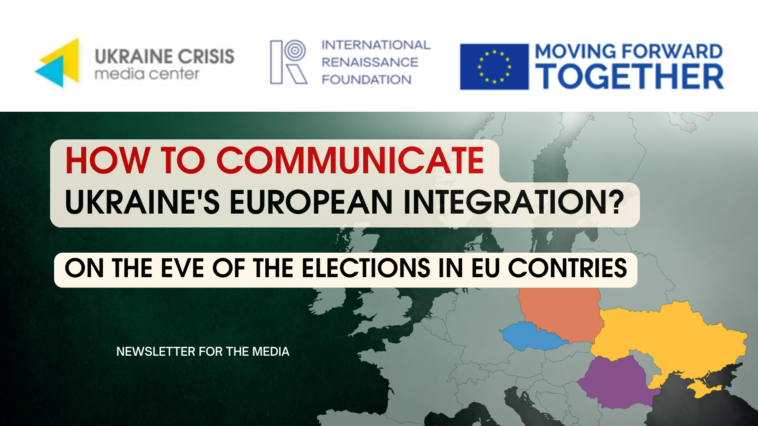Information bulletin for the media
The year 2025 may become a landmark in the relations between Ukraine and the European Union. It is expected that Ukraine will soon open the first cluster (Fundamentals) in its accession negotiations with the EU. Kyiv’s ambitious goal is to open all six clusters within the current year.
According to opinion polls, there is a strong public consensus in Ukrainian society on Ukraine’s European future. In addition to the economic aspect, European integration is a key element of the system of national resistance and defense against Russian aggression. Thus, the issue of EU membership remains extremely relevant for Ukraine’s sustainable development.
At the same time, the idea of Ukraine being the EU member has been the subject of long-term information attacks by Euro- and Ukraine-skeptic media and political actors in the EU. Their activities pose a potential threat to the dynamics of the negotiation process by creating an unfavorable information background around Ukraine’s European integration.
Russia is actively using skepticism about EU enlargement to interfere in the politics of European capitals and discredit Ukraine. The agenda of local far-right and populist forces contributes to Russian narratives.
Against this background, elections are a particularly vulnerable period in the information environment. In democracies, election campaigns are characterized by an acceleration of the flow of news and media content on socially and politically significant topics. These risks become especially relevant in the coming months of 2025 due to the elections in Poland, Romania, and the Czech Republic. In particular, in May, presidential elections will be held in Poland and Romania, and in the fall, citizens of the Czech Republic will elect a new parliament.
The relevance of the study of the information component of the elections in Poland and Romania is due to their status as Ukraine’s neighboring countries, which strengthens the voice of Warsaw and Bucharest in the negotiations on Ukraine’s membership in the EU. In addition, in 2023-24, in all three countries public actions took place that shaped these nations’ public perception of Ukraine’s European integration as a potential threat to the economic well-being of these countries.
In addition, all three states play an extremely important role in ensuring Ukraine’s defense capability, which is an important condition for the latter’s European reforms on its path to the EU. Therefore, the elections in Poland, Romania, and the Czech Republic in 2025 could be used by Russia to make new attempts to discredit the policy of supporting Ukraine, including the prospects for Ukraine’s European integration.
Elections 2025 in Poland, Romania, and the Czech Republic: Key intrigues and threats in the context of supporting Ukraine’s European integration
Czech Republic
Intrigue. The main intrigue of the Czech parliamentary elections is the possible return to power of Andrej Babiš, the country’s prime minister in 2017-2021. During the 2023 Czech presidential election, Babiš portrayed his main opponent, former Chief of the General Staff of the Czech Armed Forces Petr Pavel, as a “war candidate.” Probably, in the fall, during the parliamentary campaign, the ANO party, which is headed by the former prime minister, may exploit the threat of war due to the high level of support for Ukraine by the current government and president of the Czech Republic.
Threat to Ukraine’s European integration. As early as February 2024, Babiš stated that he did not support Ukraine’s accession to the European Union, calling this prospect a “complete disaster.” Babiš also criticized the Czech government for what he saw as excessive attention to helping Ukraine at the expense of the interests of Czech citizens.
However, as of the beginning of this year, representatives of the ANO party have been publicly demonstrating support for Ukraine, which may indicate a revision or adjustment of their position. Therefore, during the parliamentary elections in the Czech Republic, the most consistent criticism of Ukraine’s prospects for EU membership will come from the far-right (parties such as Freedom and Direct Democracy (SPD), Tricolor, and Law Respect Expertise (PRO)) and far-left (the Enough! bloc).
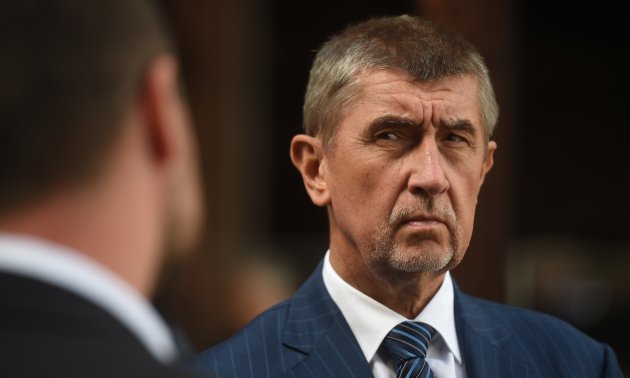
Poland
Intrigue. On May 18, Poland will hold the first round of presidential elections. The favorite of the first round is Warsaw Mayor Rafał Trzaskowski, who is supported by the pro-government coalition and the government led by Donald Tusk (Civic Platform). Until recently, it was believed that Karol Nawrocki, a candidate from the largest opposition party, Law and Justice (PiS), would compete with Trzaskowski in the second round. However, in recent weeks, the candidate from the right-wing Confederation party, Slawomir Mentzen, has caught up with Nawrocki in polls, and according to some reports, even surpassed him. The dynamics of the growth of the Confederation candidate’s rating indicates that the representative of the Confederation, which is associated in the Ukrainian media space with blocking the border and a violent stance on issues of historical memory, may unexpectedly break into the second round of the presidential election.
Threat to Ukraine’s European integration. Mentzen publicly supports military assistance. However, in his political campaign, the right-wing candidate actively appeals to narratives built on the historical memory of Poles. For example, on the third anniversary of the full-scale Russian invasion, Mencen visited Lviv, where he recorded a video in which he called Stepan Bandera “a terrorist who was sentenced to death by a Polish court for killing Poles during the Second Polish Republic.” This statement was condemned by the Ministry of Foreign Affairs of Ukraine.
It should be recalled that earlier the PiS candidate, Nawrocki, stated that he “does not see” Ukraine in the EU and NATO until “important civilizational issues for Poles are resolved,” i.e., the Volyn tragedy is settled. Thus, the presidential election may result in an increase in the linkage of historical issues to the issue of Ukraine’s European integration in the Polish public consciousness.

(Photo: @slawomirmentzen / Instagram / screenshot from video)
Romania
Intrigue. The catalyst for the surge in the popularity of Romanian far-right politicians was the unexpected victory of independent candidate Călin Georgescu in the first round of the November 24, 2024 presidential election. However, the election was soon canceled. Georgescu is accused by the authorities of financial fraud and incitement to actions against the constitutional order. In the end, Georgescu’s candidacy was not allowed to run again. In these circumstances, the role of a “backup candidate” around whom the right-wing forces would consolidate went to the leader of the Alliance for the Unification of Romanians (AUR), George Simion. He won 14% of the vote in the first round of the presidential election. Simion can also count on the votes of Georgescu’s supporters. In addition, Simion’s candidacy was supported by the head of the Party of Young People (POT), Anamaria Gavrilă, who had been building her political career in AUR until 2021. Thus, an unofficial alliance of far-right political parties (AUR-SOS-POT), led by a single candidate, Simion, has entered the finish line of the presidential election in Romania. Therefore, the chances of the right-wing candidate to make it to the second round are estimated to be quite high.
The threat to Ukraine’s European integration. The topic of support for Ukraine has become one of the main leitmotifs of the Romanian far-right politicians’ election campaign. At the same time, the transformation of AUR’s radical rhetoric is noteworthy. The discourse of the political party is becoming more complex, as in the beginning of 2025, open pandering to Moscow and appeals to anti-European narratives are being “compensated” by a demonstrative “centering” of the party’s position. Accordingly, the rhetoric of the party’s speakers becomes more moderate on the issue of Ukraine.
In his public statements, George Simion simultaneously condemns Russian aggression and opposes military aid to Ukraine. In addition, in the European Parliament, AUR is a member of the Alliance of Conservatives and Reformists in Europe, in which the leading role is played by parties and leaders who support Ukraine’s European future, namely Jaroslaw Kaczynski’s Law and Justice, Italian Prime Minister Giorgia Meloni’s Brothers of Italy, and Czech Prime Minister Petr Fiala’s Civic Democratic Party. Thus, Simion can take a more moderate stance in supporting Ukraine and issues related to Kyiv’s European integration.

Under these circumstances, communication with civil society and the media in the EU is one of the key methods of countering destabilizing influences from Russia.
Expert survey
Given this, within the project “Ukraine’s European Integration and Elections in EU countries. Informational perspective” the Ukraine Crisis Media Center conducted an expert survey by the questionnaire method.
More than 115 journalists, academia, political scientists, information security experts from the Czech Republic, Poland and Romania took part in the study.
The survey was conducted from March 10 to 20, 2025.
The purpose of the survey is to find out how the expert community of the Czech Republic, Poland and Romania perceives the trends and dynamics of media coverage of Ukraine’s European integration in the information space of their countries.
Among other things, respondents were asked to answer the following questions:
- How relevant is the topic of Ukraine’s European integration in the information discourse of the Czech Republic / Poland / Romania as of March 2025?
- Do you expect that the topic of EU enlargement, in particular Ukraine’s accession, will be used by political actors in election campaigns?
- Are there any manipulative narratives and disinformation related to Ukraine’s European integration in traditional media (television, press, radio) or social platforms (Facebook, TikTok, X, etc.)?
The results of the expert survey showed the following:
The presence of the topic of Ukraine’s European integration in the media space of Poland, Romania and the Czech Republic
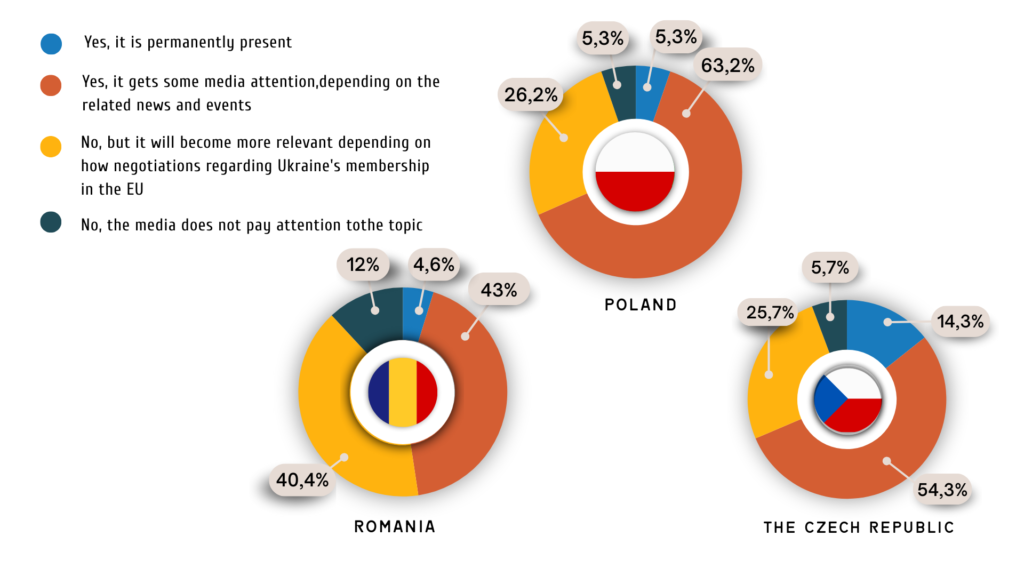
- The opinions of Romanian experts were equally divided. At the same time, it is worth noting that only 2 out of 42 respondents believe that the topic of Ukraine’s European integration receives sufficient coverage in the Romanian media.
- The largest share of Polish respondents noted that the topic of Ukraine’s European integration is partially present in the Polish media space, while about 25% believe that this issue may return to the agenda depending on the development of events.
- More than half of the experts from the Czech Republic note that the topic of Ukraine’s European integration is sporadically present in the media space of their country.
Will the topic of EU enlargement, including Ukraine’s accession, be used by political actors in election campaigns?
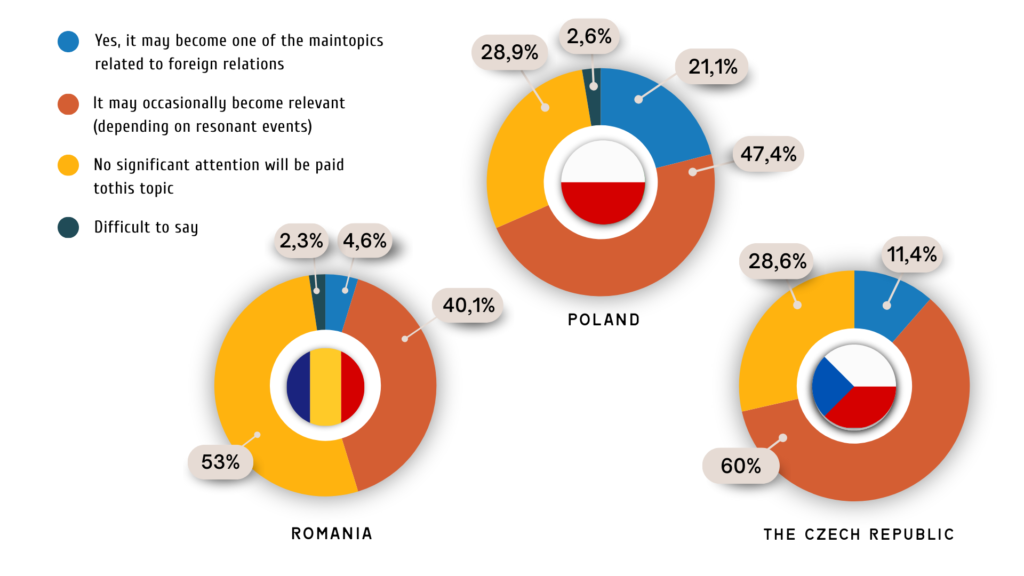
- Romanian experts note an extremely low level of interest in the topic of Ukraine’s European integration among presidential candidates.
- Only 21% of Polish experts surveyed expect that topics related to Ukraine’s European integration will receive significant coverage and attention from presidential candidates.
- 60% of respondents from the Czech Republic said that the topic of Ukraine’s European integration will be on the political agenda of the parliamentary elections in the Czech Republic, depending on the developments. At the same time, one-third of respondents believe that this issue will not arouse interest among the participants in the election race.
The presence of manipulative narratives and disinformation related to Ukraine’s European integration in traditional media or social platforms
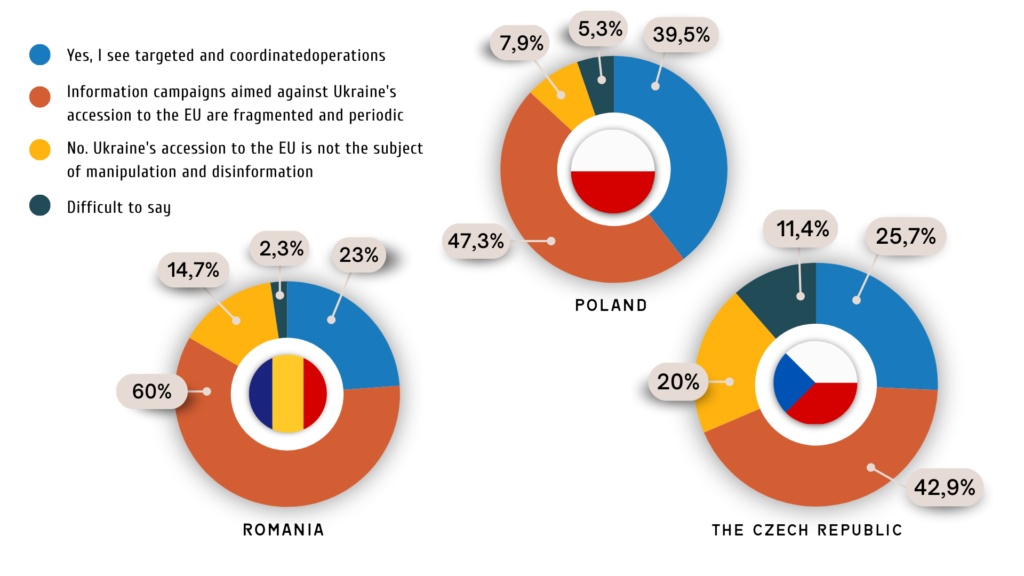
- 60% of respondents from Romania believe that information operations against Ukraine’s European integration are fragmented and periodic.
- Polish experts’ opinions on whether the information campaigns against Ukraine’s European integration are coordinated or rather executed ad hoc were almost equally divided.
- Almost half of the Czech respondents believe that information campaigns against the idea of Ukraine’s European integration are situational. At the same time, a quarter of the experts note targeted discrediting campaigns.
Recommendations
As a part of the project “Ukraine’s European Integration and Elections in EU countries. Informational perspective”, Ukraine Crisis Media Center also conducted a series of interviews with leading experts from Poland, Romania and the Czech Republic. During the interviews, the experts provided the following recommendations for improving communication with civil society and the media in the three countries.
Poland. Łukasz Adamski, political analyst and deputy director of the Juliusz Meroszewski Center for Dialogue, noted that one of the key elements of successful communication is objective knowledge of the political and social situation of partner countries. For example, commenting on the media coverage of Ukrainian-Polish relations, the expert noted a dangerous tendency to ignore complex political processes in favor of generalizations.
Watch the full interview:
The Czech Republic. Pavel Havlicek, Research Fellow at the Association of International Affairs (Czech Republic), emphasized the importance of active communication between journalists and media representatives as a way to “increase Ukraine’s presence” in the Czech information space. In addition, the analyst noted that joint projects within think tanks and cooperation between academic institutions can form important points of intersection for both countries due to the existent potential for mutual growth and exchange of experience.
Watch the full interview:
Romania. Iulian Chifu, a Romanian foreign policy analyst and former presidential advisor, raised the importance of holding consultations between the authorities of the countries on sensitive issues, including the Romanian diaspora in Ukraine.
Watch the full interview:
As a result, experts of Ukraine Crisis Media Center have formulated a number of recommendations for the Ukrainian media and the expert community on how to develop and improve communication with civil society and the media in Poland, Romania and the Czech Republic, namely:
- Take into account the internal political situation and social trends of individual EU countries when covering bilateral relations;
- Cooperation and exchange of experience between Ukrainian media and journalists from EU countries;
- Take into account that not all negative trends and news stories about Ukraine are caused solely by Russia’s influence, some of them are due to the logic of internal political processes;
- Developing country-specific expertise, learning the language of the country of study;
- It is important to avoid generalizations and excessive emotionality (manipulative and clickbait headlines, and hasty statements tend to create a negative perception);
- Establish communication links with influencers who may be skeptical about Ukraine’s European integration, engage them in direct and constructive dialogue;
o Communicate about historical contradictions, emphasizing the common historical enemy (Russia) and focus on the future; - Increase the amount of media content in local languages in local social networks about common lessons of history and aspects of mutually beneficial economic cooperation with Ukraine.
The UCMC team is convinced that following these recommendations will help to increase the level of understanding of the pan-European context of the Russian-Ukrainian war and the importance of the success of a European Ukraine for the EU countries.
The publication was compiled with the support of the European Union and the International Renaissance Foundation within the framework «European Renaissance of Ukraine» project. Its content is the exclusive responsibility of the authors and does not necessarily reflect the views of the European Union and the International Renaissance Foundation.

